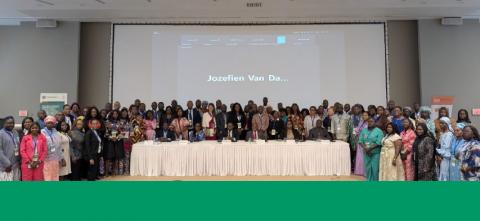
Regional Advocacy Workshop for Enhanced National Legal and Regulatory Documents and Instruments in line with Continental and Regional Provisions on the Minimum Age for Marriage, Girls' Consent, Education, and Gender-based Violence, November 26-28, 2024, Lomé, Togolese Republic.
Lomé, November 26-28, 2024 - The Regional Advocacy Workshop for the improvement of national legal and regulatory documents and instruments according to continental and regional standards is currently taking place in Lomé, Togolese Republic. This regional event brings together representatives from various West and Central African ministries in charge of the subject matter, international organizations, and civil society stakeholders, all united in the goal of promoting robust legal frameworks for women's and girls' rights.
Focused on compliance with regional and international standards, this workshop addresses fundamental issues such as minimum marriage age, consent, girls' education, and the fight against gender-based violence. Discussions also highlight gaps in national laws and best practices to address these challenges.
During the opening ceremony, Dr. Edwige DOMINGO ADEKAMBI, UNFPA Acting Resident Representative in Togo, representing the UNFPA Regional Director for West and Central Africa, welcomed the organization of this workshop, which she described as a crucial moment for strengthening women's and girls' rights and opportunities. "Starting this event during the 16 Days of Activism against Violence against Women and Girls sends a strong signal of our collective commitment. Every day, millions of girls are denied their fundamental rights. We must act with urgency and determination to change this reality," she stated. Dr. ADEKAMBI also highlighted the need for enhanced collaboration among partners, emphasizing that only concerted action will achieve sustainable and inclusive results in the region.
The World Bank Resident Representative's delegate in Togo, Fatima BARRY, emphasized the crucial importance of investing in legal frameworks favorable to women and girls, while highlighting their economic impact. "Investing in legal frameworks that support women's and girls' rights is not just a moral imperative; it's also an essential strategy for economic and social development. A society where rights are respected is a more prosperous and inclusive society," she affirmed. She also reiterated the World Bank's commitment to supporting initiatives aimed at harmonizing legal frameworks and promoting women's and girls' empowerment in the region, particularly through flagship programs such as the SWEDD project.
In his address, Dr. Yves MONGBO, representing the Director General of the West African Health Organization (WAHO), emphasized the strategic scope of this workshop, stating: "Sexual and reproductive health, which brings us together here, is a fundamental human rights and sustainable development issue. Ensuring robust and harmonized legal frameworks is essential for protecting women's and girls' fundamental rights while supporting their empowerment." He also stressed the need to intensify advocacy and concerted actions to implement commitments by aligning national legislation with continental and regional standards, and accelerating the necessary transformations to achieve the objectives of Agenda 2063, the Africa We Want.
Dr. Kokou WOTOBE, Secretary General of the Ministry of Health and Public Hygiene of Togo, representing the Minister, officially launched the Regional Workshop, underlining Togo's commitment to aligning its legal frameworks with regional and continental standards. In his inaugural speech, he stated: "The adoption of these community guidelines will represent a major step forward by addressing the shortcomings observed in certain national legislations. These guidelines will establish a harmonized framework for sexual and reproductive health rights at the regional level, thus consolidating member states' commitment to coherent and inclusive legislation." He reiterated the Togolese authorities' determination to translate recommendations into concrete actions while commending the mobilization of participants and partners present.
The workshop program, spanning three days, alternates between plenary sessions, group work, and interactive exchanges. Expected outcomes include a roadmap for each country and tailored strategies to bridge identified gaps in national legislation. This workshop benefits from the support of several partners, including PROPEL Health and Ipas Francophone Africa. It marks a decisive step in the process of strengthening sexual and reproductive rights within ECOWAS.
